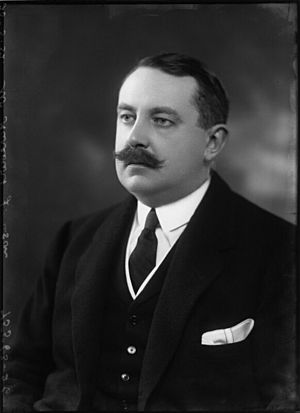Harcourt Johnstone facts for kids
Quick facts for kids
Harcourt Johnstone
|
|
|---|---|
 |
|
| Member of Parliament for Middlesbrough West |
|
| In office 7 August 1940 – 1 March 1945 |
|
| Preceded by | F. Kingsley Griffith |
| Succeeded by | Don Bennett |
| Member of Parliament for South Shields |
|
| In office 27 October 1931 – 25 October 1935 |
|
| Preceded by | James Chuter Ede |
| Succeeded by | James Chuter Ede |
| Member of Parliament for Willesden East |
|
| In office 3 March 1923 – 9 October 1924 |
|
| Preceded by | Harry Mallaby-Deeley |
| Succeeded by | George Stanley |
| Personal details | |
| Born | 19 May 1895 Kensington, London, England |
| Died | 1 March 1945 (aged 49) Westminster, London, England |
| Political party | Liberal |
| Parent |
|
| Alma mater | Balliol College, Oxford |
| Military service | |
| Allegiance | |
| Branch/service | |
| Unit | Rifle Brigade |
| Battles/wars | First World War |
Harcourt Johnstone (born May 19, 1895 – died March 1, 1945) was a British politician. He was a member of the Liberal Party and was known by his nickname, Crinks.
Early Life and Education
Harcourt Johnstone was born in London in 1895. His father, Sir Alan Johnstone, was a British diplomat. A diplomat is someone who represents their country in other nations. Harcourt's mother was Antoinette Pinchot, an American.
His nickname 'Crinks' came from his face, which was said to be wrinkled when he was a baby. One of his family members was Sir William Vernon Harcourt. He was an important politician in the past.
Harcourt Johnstone went to Eton College and Balliol College, Oxford. These are famous schools in England. During the First World War, he served in the Rifle Brigade. He also worked on the staff in France and Belgium.
Political Career
Harcourt Johnstone became interested in politics. He tried to become a Member of Parliament (MP) for Willesden East in 1922 but did not win. However, the MP for that area resigned in 1923. This led to a special election called a by-election.
Johnstone ran again for the Liberals and won the seat. He became an MP in March 1923. He kept his seat in the 1923 general election. But he lost it in the 1924 election.
He tried to get back into the House of Commons (the main part of the UK Parliament) several times. He ran in by-elections in 1925 and 1927, but he lost both. In 1931, he finally won a seat for South Shields. He lost this seat in 1935.
In May 1940, Winston Churchill chose Johnstone to join the government. He became the Secretary to the Department of Overseas Trade. Two months later, the MP for Middlesbrough West left his job. Johnstone was then elected for this seat without anyone running against him. This happened because of a special agreement during wartime. In 1943, he was made a Privy Councillor. This is a special title given to important people who advise the King or Queen.
Important Roles in Government
Harcourt Johnstone was a very important Liberal member of the government during World War II. He worked closely with Sir Archie Sinclair, who was the leader of the Liberal Party.
Johnstone played a key role in the Liberal Party between the two World Wars. He was the Secretary of the Liberal Candidates Association. He also used a lot of his own money to help the Liberal Party. He strongly supported Free Trade, which means allowing goods to be traded between countries without taxes or restrictions.
His return to government in 1940 was partly because he was friends with Churchill. Johnstone was also a member of "The Other Club." This was a political dining club started by Churchill. Johnstone was known for enjoying life, including his love for books, furniture, and art.
Death
Harcourt Johnstone died suddenly in March 1945. He was only 49 years old. He passed away at Westminster Hospital from a stroke.
A special service was held for him at St. Margaret's Church, Westminster. Many important people attended, including Prime Minister Winston Churchill and his wife Clementine. The Deputy Prime Minister, Clement Attlee, and Anthony Eden were also there.
 | Bessie Coleman |
 | Spann Watson |
 | Jill E. Brown |
 | Sherman W. White |

